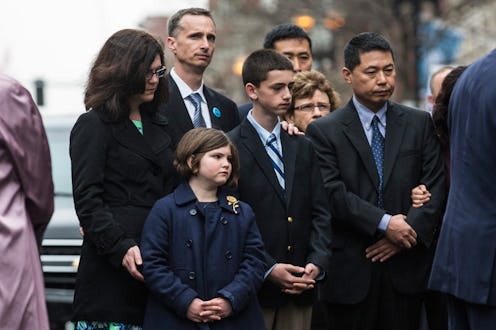News
Would Tsarnaev's Victims Testify At An Appeal?
A panel of jurors on Friday sentenced 2013 Boston Marathon bomber Dzhokhar Tsarnaev to death for his part in what officials have called the worst terrorist attack on U.S. soil since 9/11. The verdict sent shock waves through the media and prompted speculation over whether the sentence would be overturned. As the next phase of the court process begins, the question now becomes whether any of Tsarnaev's victims will be asked to testify in appeal hearings.
The capital punishment appeals process is a lengthy one — something that many of Tsarnaev's victims knew at the onset of the trial. The parents of one young victim, 8-year-old Martin Richard who was killed in the twin blasts on the afternoon of April 15, 2013, even published an op-ed in The Boston Globe last month, begging prosecutors to take the death penalty off the table, knowing that if Tsarnaev were sentenced, it would be years before they received closure.
"We know that the government has its reasons for seeking the death penalty, but the continued pursuit of that punishment could bring years of appeals and prolong reliving the most painful day of our lives," wrote Bill and Denise Richard. "We hope our two remaining children do not have to grow up with the lingering, painful reminder of what the defendant took from them, which years of appeals would undoubtedly bring."
ABC News reported on Friday that if Tsarnaev's lawyers choose to run the full gamut of appeal hearings, the exhaustive litigation process could take years — something that worn-out family members in other lengthy cases have openly admitted to.
"I learned the hard way that the death penalty is an albatross over the heads of victims' families," said Jim O'Brien, father of 25-year-old victim Deirdre, who was killed in 1982 during a string of serial murders in New Jersey. "From 1982 until 1990 I lived day to day, appeal to appeal, decision to decision, [waking] up every day and wondering what might happen that day ... the toll it took on me and my family was horrendous," he told The Morris County Daily Record in 2007.
As it stands, most appeals made by a defendant's lawyers are based heavily on court proceedings rather than testimony from witnesses, although evidence may be presented. In Tsarnaev's case, it is likely his lawyers will argue for a re-trial and a change of venue, as they did initially, and claim that their client did not get a fair trial in Boston due to the fact that much of the public knew the details of the case going into the courtroom.
If U.S. District Court Judge George O’Toole Jr, the original trial judge on Tsarnaev's case, decides to grant the defense's appeal, a new location will be selected for the hearings and the victims and their families will be called to the witness stand to relive that testimony all over again.
According to Jody Lyneé Madeira, a law professor at the Indiana University Maurer School in Bloomington, Indiana, even watching the appeals process from the sidelines could be detrimental to Tsarnaev's victims. In an op-ed for CNN.com this week, she wrote:
In adjusting to a post-verdict world, family members and survivors potentially have much soul-searching ahead of them. This adaptation may be easiest for those who decided early on not to follow news of the trial. But others who were more involved in following these matters -- or involved in proceedings themselves -- have to decide whether the time has at last come for them to look away. And if they choose to look away, they have to learn how to negotiate this potentially traumatizing "new normal," in which Tsarnaev will continue to be a constant media presence. This is their new struggle.
Whether or not Tsarnaev's lawyers will win their exhaustive appeals and be granted a new trial is still very much anyone's guess. For those mentally, emotionally, and physically scarred by his actions, however, the remedial process is a long ways off.
Images: Getty Images (2)
